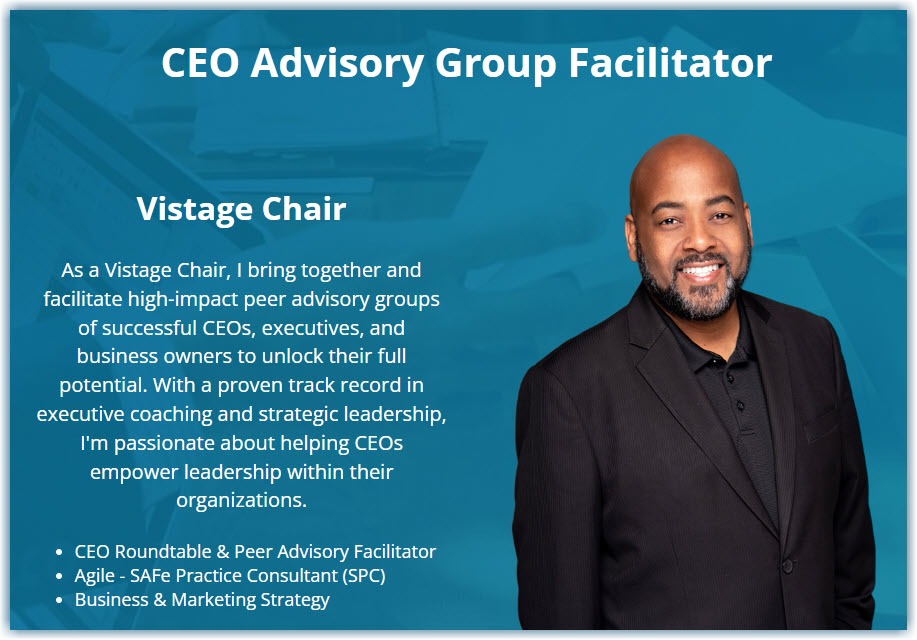Being a Chief Executive Officer (CEO) is challenging. The myriad of responsibilities associated with the role often translates into a constant juggling act, leaving CEOs in a somewhat lonely of searching for the most effective ways to navigate their decision-making process. This article aims to provide CEOs with valuable insights into managing complex decisions, drawing from the experience of other CEOs in a peer advisory group. I well formed advisory group should have the following...
An Establish a Clear Decision-Making Framework - One of the most critical aspects of decision-making is having a consistent framework in place. This framework should outline the steps to be taken when faced with important decisions, allowing for a structured and systematic approach. A well-defined decision-making framework helps eliminate uncertainty, speeds up the process, and reduces the risk of errors.
Key components of a decision-making framework include:
- A clear way of identifying the problem or opportunities
- Gathering relevant information and data associated with the problem or opportunities
- Analyzing the data and identifying potential solutions
- Evaluating the pros and cons of each option
- Making a decision based on the analysis
- Implementing the decision and monitoring the results
Prioritize Decisions Based on Impact - Not all decisions carry the same weight, and CEOs need to recognize which decisions have the most significant potential impact on their organization. By prioritizing decisions based on their potential consequences, CEOs can allocate their time and resources more effectively.
Consider using a decision matrix or another prioritization tool to help rank decisions based on factors such as strategic importance, financial impact, and urgency.
Involve the Right People - Involving the right people in the decision-making process is crucial for success. CEOs should carefully select individuals with relevant expertise and experience, ensuring that their input is well-informed and valuable. Additionally, involving stakeholders who will be affected by the decision can lead to increased buy-in and commitment to the chosen course of action.
Leverage Data and Analytics - In today's data-driven world, CEOs have access to a wealth of information that can be used to support their decision-making process. By leveraging data and analytics, CEOs can base their decisions on solid evidence and facts, reducing the risk of making choices based on gut feelings or assumptions.
Encourage Open Communication and Debate - A healthy exchange of ideas and perspectives is essential for making well-informed decisions. CEOs should foster an environment where team members feel comfortable sharing their opinions and debating the merits of different options. This open communication can lead to the discovery of innovative solutions and help prevent groupthink, a phenomenon where the desire for consensus overrides critical thinking.
Embrace Diverse Perspectives - Incorporating diverse perspectives into the decision-making process can result in more innovative and effective solutions. By seeking input from individuals with different backgrounds, expertise, and experiences, CEOs can tap into a broader range of ideas and insights, ultimately leading to better decisions.
Be Decisive and Take Action - Once a decision has been made, it is crucial for CEOs to act quickly and decisively. Delaying the implementation of a decision can create uncertainty and confusion within the organization, potentially leading to lost opportunities or negative consequences.
Learn from Past Decisions - Reflecting on past decisions can provide valuable insights into what worked well and what could be improved. By analyzing the outcomes of previous decisions, CEOs can refine their decision-making process and make more informed choices moving forward.
Cultivate Emotional Intelligence - Emotional intelligence is an essential skill for CEOs, particularly when navigating complex decisions. By recognizing and managing their emotions, CEOs can make more objective decisions and better understand the emotional impact their choices may have on others.
Accept That Not All Decisions Will Be Perfect - Despite their best efforts, CEOs will sometimes make suboptimal decisions. CEOS must accept that not all decisions will be perfect. The reality is that even the most experienced and skilled leaders will occasionally face setbacks or unintended consequences due to their choices. What differentiates successful CEOs is their ability to learn from these experiences and adapt their decision-making process accordingly.
In summary, navigating the complex world of CEO decision-making requires a blend of strategic thinking, emotional intelligence, and a willingness to learn and adapt. By establishing a clear decision-making framework, prioritizing decisions based on impact, involving the right people, leveraging data, and fostering open communication, CEOs can make more informed choices that drive their organizations toward success.
As a CEO, continuously refining and improving your decision-making abilities is essential. Engaging with a CEO Advisory Group can provide invaluable support and guidance, connecting you with a network of like-minded peers and seasoned experts who can help you navigate the challenges and opportunities of the role.
By regularly reading informative and insightful content, such as the blog posts suggested here, CEOs can stay ahead of the curve and make informed decisions that contributing to their organization's growth and success. Keep an eye out for the upcoming blog posts, which will delve deeper into various aspects of CEO leadership and provide practical advice for overcoming challenges and capitalizing on opportunities:
- Time Management Strategies for Busy CEOs: Achieving Balance and Boosting Productivity
- Building a High-Performance Team: The CEO's Role in Attracting and Retaining Top Talent
- Staying Ahead of the Curve: How CEOs Can Leverage Industry Trends for Strategic Growth
- The Future-Proof CEO: Embracing Innovation and Adaptability in a Rapidly Changing World
- Creating a Thriving Company Culture: A CEO's Guide to Fostering a Positive Work Environment
- The Power of Networking for CEOs: Building Meaningful Connections for Business Success
- Mergers and Acquisitions: A CEO's Playbook for Ensuring a Smooth Transition
- From Vision to Execution: How CEOs Can Translate Strategy into Action for Optimal Results
- The Ethical CEO: Balancing Profitability with Social Responsibility and Environmental Impact
Stay tuned for these informative and engaging blog posts designed to help CEOs like you navigate the complexities of leadership and decision-making, all while staying true to the informative, Donald Miller-inspired tone. Investing time in continuous learning and self-improvement can elevate your leadership skills, make better decisions, and drive your organization to new heights.

Live in Atlanta, Georgia or surrounding areas?
I am putting together a CEO Advisory Group in Atlanta. If your company generates 5M+ in revenue and you would like to know what it's like to be part of a peer advisory group, find some time on your calendar for a interview and informational session to learn how to become a member of our next group.



Write A Comment